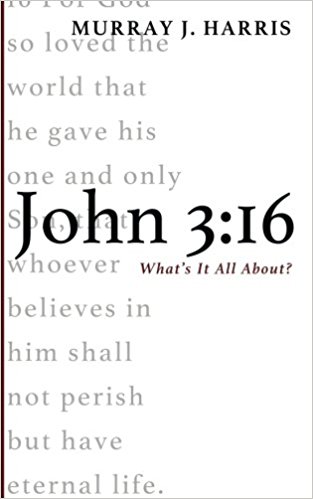
Murray J. Harris
Reviewed by: Mark J. Larson
John 3:16: What’s It All About? by Murray J. Harris. Cascade Books, 2015. Paperback, 54 pages, list price $8.00. Reviewed by RCUS minister Mark J. Larson.
Murray J. Harris is professor emeritus of New Testament exegesis and theology at Trinity Evangelical Divinity School. He calls the twenty-five words in the Greek text of John 3:16 the most famous sentence in all literature. In this short book, he provides an excellent exposition of this famous passage, which is the heart of the gospel.
One of the strengths of this volume is that Harris constantly emphasizes context. He begins by placing John 3:16 in the wider context of the gospel of John and the more narrow context of Jesus’ conversation with Nicodemus. He argues that verses 1–10 present a dialogue between Jesus and Nicodemus, which are then followed by Jesus’ monologue in verses 11–21. He acknowledges, though, that the monologue may end at verse 15, making verses 16–21 the reflections of the apostle John.
Harris divides the text of John 3:16 (following the NIV) into eight sections, providing two or three pages for each phrase. The exposition is intelligible without any knowledge of Greek, but there are copious footnotes for Greek enthusiasts.
Harris contends that the word kosmos, translated “world,” refers to “all humans without distinction or exception” (p. 13). Preferable is Warfield’s exegesis, that it refers to “all that is evil and noisome and disgusting” (“God’s Immeasurable Love,” p. 514). Ironically, Harris recognizes that in the John “there are ominous, negative ideas attaching to the term kosmos“ (p. 13), but he chooses to go with a universal and distributive meaning here.
I do appreciate, however, his handling of the clause “whoever believes in him.” Harris writes that there is “an open and warm invitation to all and every—’whoever believes’” (p. 19). Calvin understands the passage in the same way: “He has employed the universal term whosoever … to invite all indiscriminately to partake of life” (Commentary on John, p. 125). The general call is part of the good news without a doubt.
In connection with this universal invitation, Harris does an outstanding job in explaining what John is driving at in his distinctive expression “believe in him.” Harris explains, “To believe in Jesus is to have faith that is directed towards him, faith that is focused on him.” “It involves the total commitment of one’s whole self to the person of Christ as Messiah and Lord forever” (p. 20). This is indeed the gospel invitation—to give ourselves in total allegiance to Jesus, to cast ourselves upon him completely for our salvation.
This little volume is a clear and scholarly presentation of the gospel, a book that we can share with people who need to know the way of salvation.
November 23, 2025
November 16, 2025
November 09, 2025
November 02, 2025
October 26, 2025
October 19, 2025
October 05, 2025
Raising Sexually Faithful Kids and
Parenting Boys and Girls in a Gender-Confused World
© 2025 The Orthodox Presbyterian Church